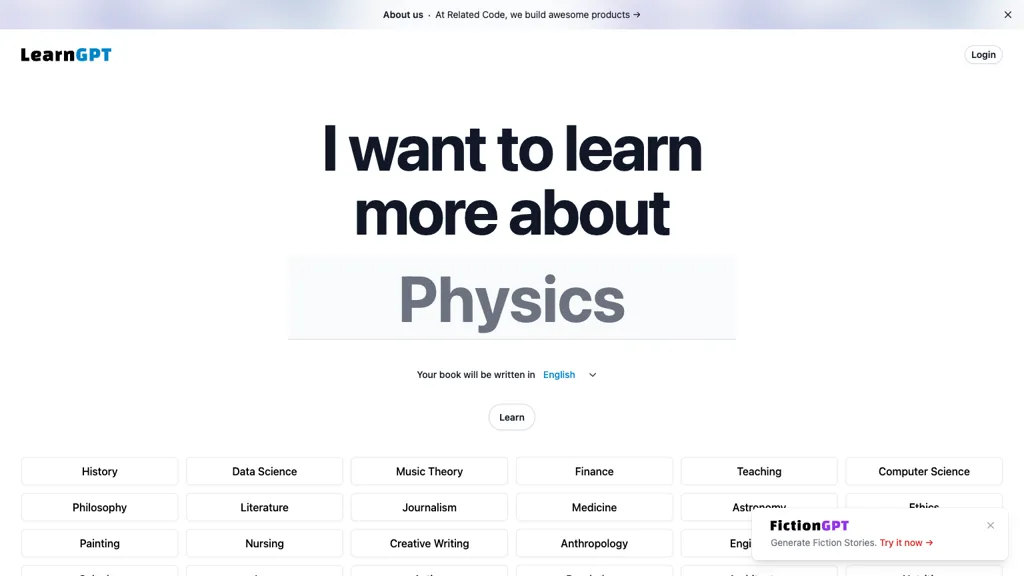What is LearnGPT?
LearnGPT is a sophisticated AI tool designed to assist users in generating content on the widest array of subjects. Interest in history, data science, music theory, finance, or any other area—LearnGPT will never leave you unsatisfied with informative, engaging text tailored to your needs. Built to engage writing through a prompt—topic one wishes to write about—LearnGPT kickstarts your writing, making this tool very useful for teaching, journalism, or even fiction writing.
It was designed to make content creation smooth for LearnGPT users to delve into many different domains and effortlessly improve their knowledge. It is an ideal tool for students, professionals, and enthusiasts looking to efficiently generate content.
Key features and associated benefits for LearnGPT will include content generation, which automates generating content to save much-needed time and efforts. It has a wide range of topics for a huge array of subjects to suit varied interests and needs.
-
Informative and Engaging Texts:
Produces high-quality texts that are informative and engaging. -
Input on Specific Topics for Generation:
This system allows users to make topic inputs so that generated content could be tailored accordingly. -
Knowledge Enrichment:
It helps users enrich their knowledge in various fields.
What makes LearnGPT special is the fact that this AI can speed up your production of well-researched, relevant content. This will benefit everyone who wants to learn more or generate content for educational purposes, journalism, or even creative writing.
Use Cases and Applications of LearnGPT
LearnGPT can be used in a lot of different scenarios; hence, it becomes a versatile tool for a vast number of user groups in the following ways:
-
Educational Materials:
Engaging and informative material on many subjects for students can be generated, hence making teaching and learning easy. -
Journalistic Articles:
It can generate well-researched articles on diverse subjects with little wastage of time, hence saving the journalist’s time in developing articles. -
Fiction Writing:
Fictional stories will come with detailed settings and backgrounds. By doing this, it will help the writer in brainstorming his story and plot.
Whether students, professionals, or hobbyists, LearnGPT will massively improve one’s ability to create content.
How to Use LearnGPT
Using LearnGPT comes easy due to the simplicity and usability of the interface. The following are ways to get you started:
-
Enter Your Topic:
Place the subject or topic for which you want to get content. -
Generate Content:
Let LearnGPT process the information and generate text relevant to that information. -
Review and Edit:
Go through the generated content and make edits as may be necessary to suit your requirements. -
Use the Content:
Use the final content for your purpose, whether it be educational material, articles, or stories.
For best results, clearly describe what to write about in your input topics and use the editing feature to fine-tune the content into your style and tone.
How LearnGPT Works
It uses advanced machine learning algorithms with NLP models to generate content after analyzing large chunks of data provided by a user, hence enabling the production of coherent and contextually relevant text. The workflow usually entails:
-
Data Analysis:
LearnGPT processes input data to understand the topic. -
Content Generation:
Generation of relevant and engaging text using NLP models. -
Output Delivery:
At last, the content is presented to the user for review and editing.
This technology makes sure that the content generated is accurate, informative, and aligns with the user’s needs.
Pros and Cons of LearnGPT
Being any tool, LearnGPT comes with its positives and some probable negativities:
Pros
- Content generation is efficient.
- Covers all kinds of topics.
- Outputs are high-quality and engaging in terms of text.
- User interface is very friendly.
- Improves or enhances knowledge in different subjects.
Cons
- In order to achieve perfection, it may require manual editing.
- The quality and scope of the input data are limited.
Overall, the tool is referred to by users as efficient and resourceful, but there are cases when refinement of content is necessary.
Conclusion about LearnGPT
LearnGPT thus provides an ideal tool for generating content covering a wide span of subjects. Among the main characteristics, topic diversity, coupled with high-quality text output, is very beneficial for every student, professional, and enthusiast. Although there are some limitations—like the need to edit it personally once in a while—the good points far outweigh such drawbacks.
Now, with the advancement of AI technology, a lot of improvements and updates are on the way to make LearnGPT more effective and easier to use.
LearnGPT FAQs
-
What topic range is covered by LearnGPT?
LearnGPT can generate text on history, data science, music theory, finance, and much more. -
Can I use LearnGPT for business purposes?
Yes, LearnGPT can be used for professional purposes. It can aid in developing well-researched articles, educational notes, and even fiction stories. -
Does LearnGPT demand any technical knowledge to be used?
No, LearnGPT has been made user-friendly. No technical knowledge is required to operate the tool. You only have to feed in your topic of interest, and the rest is done by this tool itself. -
Can I edit the content generated by LearnGPT?
Yes, you can review, verify, and edit if required, the content generated from LearnGPT, to suit your specific needs and writing style. -
How does LearnGPT guarantee accuracy in the content generated?
LearnGPT uses state-of-the-art algorithms of machine learning and deep language processing models that read data and generate relevant and accurate content.










